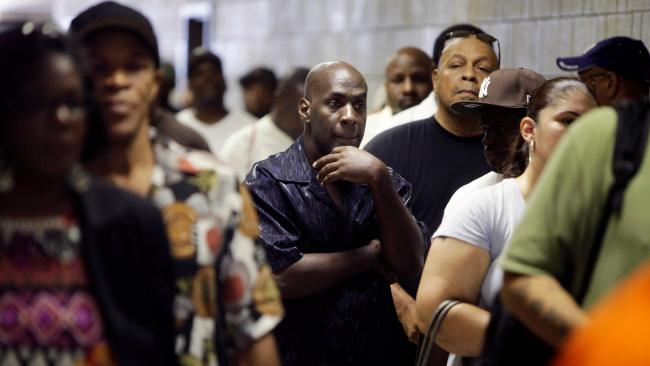(ThyBlackMan.com) Over the course of my 47 years on this earth, I’ve been called lots of names. Some are repeatable. Some are not. I’ve heard them on the playground, in the heat of competition and from irate drivers who think I spend too much time in the left-hand lane. I’ve also been habitually referred to as “YOU IDIOT!” by none other than … well … me. I have a tendency to address myself this way when I carelessly miscalculate a cut on the table-saw, lose a computer file I forgot to save or shank a backyard punt into the side of my neighbor’s house. (When will I ever learn?)
The old “sticks and stones” adage has always served me well until recently when, in the midst of a discussion about the proper relationship between Christians and the world, someone more or less connected our approach to understanding and engaging the world of popular culture with promoting pornography. “So what you’re saying is that Christians should know the culture?” I was asked. My excited answer was rather straightforward: “Yes, if God in His word charges us to reach the world with the Good News about Jesus Christ, we must understand the changing cultural context in which lost people live. To do that, anyone who works with kids needs to be familiar with what they’re watching and hearing. By doing that, we can learn how they think and what they believe. Then, we’ll be able to connect with them in language and categories they can understand, and the unchanging, life-changing and corrective truths of God’s word won’t fall on deaf ears. In effect, we’re cross-cultural missionaries!”
Case closed … or so I thought. The immediate response indicated otherwise: “So you tell those who want to reach kids to watch pornography?” Wow! “Pornographer“—that’s one I never heard on the playground! Okay, so the person didn’t intend to lump me in with Hugh Hefner and Larry Flynt. But somehow, in his mind, I wasn’t sharing the Gospel anymore. Instead, I was  promoting pornography and leading people down the compromising road to perdition. Ouch. Those sticks and stones really hurt.
promoting pornography and leading people down the compromising road to perdition. Ouch. Those sticks and stones really hurt.
To be honest, I’ve heard variations on this argument dozens of times before so it really wasn’t anything new. I responded as I have for years. First, I clarified that pornography is an expression of sinful, fallen sexuality and it certainly isn’t a place God wants us to go. Nor is it a place I indirectly suggest people go. It’s not a legitimate art form that in and of itself is redeemable. It’s to be avoided, because it’s left a trail of destroyed individuals, marriages and families in its ugly wake. Neither would I suggest to a parent or youth worker that they go look at pornography if they discover their kids are spending time in it. If I discovered my son was spending his time in some of the deepest and darkest corners of the Internet, I wouldn’t say, “Hey buddy, let’s sit down and look at this together so we can talk about it.” That would not only be wrong, but ridiculous. I’ve seen it. He’s seen it. Neither of us need to see it again. But because I’ve seen it and know where it comes from, what it is and what it does, I would sit down with him and talk about it.
Second, I challenged the faulty logic followed in the argument. My inquisitor had fallen into the classic mistake of employing the flawed “slippery slope” approach to logic. In his mind, if “A” happens (in this case, “anyone who works with kids and wants to effectively share the Gospel should be familiar with what they see and hear“), then through a series of small steps from “A,” “B,” “C,” … “X,” “Y” and eventually “Z” (“you’re promoting pornography“) will happen, too. Then, because “Z” shouldn’t happen, “A” shouldn’t happen either. If that’s the case, then Jesus, Paul and every cross-cultural missionary since has messed up big time.
The conversation continued and it became clear to me that the root issue wasn’t necessarily pornography. Rather, it was our differing understandings of what it means to be “holy.” We all agreed that God calls us to “be holy.” But we parted ways on how we are to live and conduct ourselves in our sinful and fallen world. In his understanding, to be holy meant that he was required to avoid contact of any type with the ungodly elements of popular culture. In my understanding, we’ve been commanded to go into it.
Because of the question I had been asked and the conclusions that had been reached, I decided that I should “regroup” and humbly re-evaluate my understanding of “holiness.” What if I’ve been wrong all this time? After all, I don’t want to defend, promote, live or teach a flawed understanding that isn’t faithful to God’s will for those who are His own. In order to check the validity of my understanding of how to approach matters of faith and culture, I needed to take another look at my understanding of “holiness.”
My trip back to square one had to start with the only “Holy” one. What does He say in His word about “holiness?” And rather than make the mistake of looking at and interpreting a few isolated verses on the subject, I needed to examine the full context of Scripture—examining all the parts of the Bible from start to finish as a comprehensive worldview. What did I find? Stated simply, here’s a short summary of what the Bible says about holiness:
Holiness is first and foremost a divine quality. In fact, the word captures the essential nature of God and includes all His other attributes of sovereignty, mercy, awesomeness, separateness, power, wrath, etc. When the Bible speaks of God’s holiness, it means that only God is morally perfect, and only God is uniquely set apart from all His creation. No one who has ever walked this earth—besides the God-man Jesus—has ever by nature been holy. It’s a truth we sing every time these words cross our lips: “Only Thou art holy—there is none beside Thee, perfect in power, in love and purity.”
To be holy is to be set apart by God. We are declared and become holy the moment God, by grace, brings us into a relationship with Himself through Christ. The source of our holiness is Jesus himself, who makes us holy by forgiving our sins. There’s absolutely nothing we can do to make ourselves or anyone else holy. Our holiness, righteousness and redemption are in Christ. As the writer of Hebrews says, “We have been made holy through the sacrifice of the body of Jesus Christ.”
To be holy, is to be consecrated for service to God. We are called to be set apart to serve our Creator. As a result, we are to distance ourselves from the ways and values of the world. Even though we are holy in the eyes of God, we continue to struggle with sin—something I know the reality of all too well. We must prayerfully seek to separate ourselves from sin and hold fast to Christ. To be holy means to be “different.”
Jesus is not only the source, but the standard and example of holiness. Holiness is the opposite of sin. That means it’s conformity to the character of God and obedience to his will. We are to actively seek to express our new life in Christ and our holiness by following the example of Christ. To be holy means that we will prayerfully and earnestly strive to avoid sin while reflecting the image of Christ in how we love others both inside and outside the body of Christ. “Holy, Holy, Holy” is the short answer to the great question Dean Borgman insists we ask as we minister in our contemporary culture: “How would Jesus move through the crowd today?”
Holy people live the will of God, including his call to “be in” but “not of” the world. This is the great paradox of holiness—that the God who calls us to be “set apart” turns around and tells us to “go into” the fallen world, both through the example of His Son and the commands of Scripture. On the night before his death, Jesus prayed the will of His Father for all His disciples in all times and places: “My prayer is not that you take them out of the world but that you protect them from the evil one. They are not of the world, even as I am not of it … As you sent them into the world, I have sent them into the world.” Looking at, listening to and understanding that world for the sake of advancing God’s rule and reign is not a compromise of our holiness. Instead, it is an expression of it. It’s clearly part of the role God’s called us to play in his redemption plan. While our resolve should be to avoid “living” the ways of the world, we are called to live in and understand this world and its ways. This is the service for which we’ve been set apart! To do otherwise is to keep the Christian faith locked up behind a wall of separation and fear.
To be holy doesn’t mean we keep a long list of behavioral do’s and don’ts. Sadly, this is the unbiblical reality many have adopted simply because that’s what they were taught growing up. That was the case with the Pharisees, who mistakenly believed it’s what’s outside a person, rather than what’s inside, that makes him “unclean.” Charles Colson warns us of four problems bred by this view of holiness. First, it limits the scope of true biblical holiness to just a few but not all areas of our lives. We wind up living the “out of” and not the “into” the world, thereby forfeiting our mission influence. Second, we fall into the trap of obeying rules rather than obeying God. Third, the emphasis on rule-keeping leads us to believe we can be holy through our efforts. And fourth, our “pious efforts” can lead to self-righteousness—an ego-gratifying spirituality that turns holy living into spiritual one-upmanship. The apostle Paul once lived that Pharisaical life. But after experiencing God’s grace on the road to Damascus and coming to a proper understanding of holiness, he referred to that old way of living as “dung.”
Finally, we can’t go places we can’t go. Christ has never called us to deliberately sin in order to engage the world for the sake of the Gospel. If you can’t watch it, listen to it or read it without falling into sin, then don’t. But don’t fall into the trap of equating temptation with sin. We know that Jesus, our example of holiness, was tempted in every way but did not sin. Being tempted or plagued by evil thoughts isn’t sin. If a lustful or ungodly thought enters our mind and we choose to reject it, we have not sinned. But if we seek out, embrace or entertain those thoughts for the purpose of pursuing their pleasures, then we’ve fallen into sin. Martin Luther likened the tension to the fact that evil thoughts will come like the birds that fly overhead all the time. That’s out of our control. What we can and must do is stop them from building nests in our hair. And lest we forget, the one who was tempted in every way but did not sin, promises us that we won’t be tempted beyond what we can bear, nor will he leave us without a way out! Maybe our problem is that we wind up trying to do God’s work (imparting holiness) because we don’t take Him at His word.
I love how John Stott sums up the implications of the Biblical view of holiness. He says “the whole church is called—and every member of it—as much to involvement in the world as to separation from it, as much to ‘worldliness’ as to ‘holiness.’ Not to a worldliness which is unholy, nor to a holiness which is unworldly, but to ‘holy worldliness,’ a true separation to God which is lived out in the world—the world which he made and sent his Son to redeem.”
As our battle with the world, the flesh and the devil rages on, we’ve got to be holy. But our definition of holiness will determine whether we’re in or out of the battle, on or off the battlefield. When my son’s senior season of high school football came to an end in November, I got to thinking about how much his weekly preparations for game time reflect how God’s holy people are called to relate to the world. Every Saturday morning, while the bumps and bruises were still throbbing, Josh and his teammates would gather to watch the film of the prior night’s game. They would evaluate how they played, looking to build on their strengths and correct mistakes. Then, before they even took to the practice field the following week, they would gather in the same film room to watch the tape of their opponent’s last game. Even before they started their physical preparations for the next Friday night, they were working to know more about their opponent than their opponents knew of themselves. When game time finally arrived, they would put all they had learned and practiced into action, all in an effort to win the game. But the analogy does break down. Yes, we’ve been called to battle. But it’s not the lights on the scoreboard and what they show when the clock hits 00:00 that’s at stake. Rather, it’s about people who are lost and wandering aimlessly out in the dark. Consequently, we need to be prepared.
Julia Ward Howe wrote the lyrics to the “Battle Hymn Of The Republic” during the Civil War. While Abraham Lincoln’s love for the song has led to its long association with the war, the song was actually written as a testimony to the enduring nature of God’s purpose, plan and truth. As I’ve revisited what it means to be holy, I’ve realized that one of the song’s last and most familiar lines encapsulates the truth about the source of our holiness and our response to it: “He died to make men holy, let us live to make men free.”
For all those who come to the end of a life lived boldly with that understanding, there’s going to be some name-calling. By the grace of God, I trust all of us who have lived a theology of faith and culture that is “wholly holy” and not full of holes, will stand before the Master as he says, “good and faithful servant.”
Written By Walt Mueller
Via; http://www.cpyu.org

















Leave a Reply